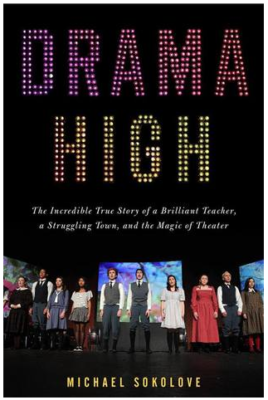Drama High – Lou Volpe – Michael Sokolove

The author Michael Sokolove was one of Lou Volpe’s English students back in the early 1970’s at the beginning of Volpe’s career in education. Four decades later, he returned to tell the story of how this teacher inspired his students and the community of Levittown, PA, by creating a first class theater program in a working class town. The book was published in 2013 and concludes with Lou Volpe’s retirement from teaching. In March of 2018, the television show Rise, inspired by this book, debuted on NBC with trans actor Ellie Desautels among the cast members and Lou Volpe on board as a consultant to the show.
The book is more than just an homage from a former student to a teacher who inspired him. There is a lot of background contained in these pages having to do with the genesis of the community itself and the students and families who live there. Levittown, PA, is one of the communities that sprung up after World War II when there was a desperate need for housing and the GI Bill made homeownership possible for returning veterans. Sokolove’s father Leonard was one such returning veteran who received both housing and educational benefits, getting an undergraduate degree and a law degree following the war. Sokolove doesn’t shy away from talking about how William Levitt’s creation of post-war suburban America was for whites only, a topic discussed in depth in The Color of Law. The working class community of Levittown is still predominately white, with a small population of Hispanics in residence now. The industries that once employed many who lived in the town are now shuttered. Volpe’s students come from families who are struggling in a variety of ways.
Lou Volpe was not involved in theater as a high school student himself. He started out at 21 as an English teacher at the high school and applied to be the assistant Theater Director. He was given the job of Theater Director when the current incumbent left the school and from that point forward became a self taught theater producer and director. Throughout the book there are references to Volpe’s love for Stephen Sondheim and particularly the musical Sunday in the Park with George, which he has seen performed more than 25 times. For him, the play is life changing. He clearly wants to create those life changing moments for his students.
It is quite remarkable that such an underfunded theater program was revered by those on Broadway who came to admire and respect what Volpe was able to do with his program and his students. Musical Theatre International (MTI), which licenses plays for production, tapped Lou Volpe to adapt several Broadway musicals for the high school stage. Among them were Les Miserables, Rent and Spring Awakening. Sokolove spent two years researching this book and in those years was there for Truman’s productions of Good Boys and True and Spring Awakening (which was re-created in the season finale of Rise on May 18th.) Some of the most interesting parts of this book are his detailed descriptions of the creative process and the student actors.
As a former high school theater student myself, everything about this book resonated with me. I took four years of Drama classes at William Byrd High School in Vinton, VA, along with my best friend Jeff. (We were the only two students in Drama III and Drama IV.) While neither of us ended up as Broadway actors, we both gained a lot from our love of the theater and our pursuit of mastery within it. And that is really the goal that Lou Volpe has from the beginning for his students.
As he retired from teaching in 2013, he thanked his fellow teachers and their commitment to keeping arts eduction alive at Truman High School: “When I leave here, I know that our students will not be just skilled or trained. They will be educated. And that’s what’s most important to me.”
I loved everything about this book. I can see how it inspired a television show in a time when arts education is seen as optional and unimportant in the grand scheme of things. Many of us understand that arts education is everything. What would humanity be without the arts?